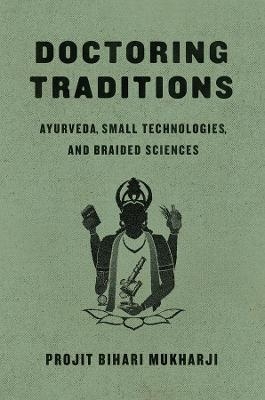
Doctoring Traditions
Ayurveda, Small Technologies, and Braided Sciences
Seiten
2016
University of Chicago Press (Verlag)
978-0-226-38179-4 (ISBN)
University of Chicago Press (Verlag)
978-0-226-38179-4 (ISBN)
- Titel z.Zt. nicht lieferbar
- Versandkostenfrei innerhalb Deutschlands
- Auch auf Rechnung
- Verfügbarkeit in der Filiale vor Ort prüfen
- Artikel merken
Like many of the traditional medicines of South Asia, Ayurvedic practice changed dramatically in the later nineteenth and early twentieth centuries. With Doctoring Tradition, Projit Bihari Mukharji offers a close look at that transformation, upending the widely held yet little-examined belief that it was the result of the introduction of Western anatomical knowledge and cadaveric dissection. Rather, Mukharji reveals, what instigated those changes were a number of small technologies that were introduced in the period by Ayurvedic physicians, men who were simultaneously Victorian gentlemen and members of a particular Bengali caste. The introduction of these devices, including thermometers, watches, and microscopes, Mukharji shows, ultimately led to a dramatic reimagining of the body. The new Ayurvedic body that thus emerged by the 1930s, while different from the biomedical body, was nonetheless largely compatible with it. The more incompatible elements of the old Ayurvedic body were then rendered therapeutically indefensible and impossible to imagine in practice.
The new Ayurvedic medicine, therefore, was the product not of an embrace of Western approaches, but of a creative attempt to develop a viable alternative to the Western tradition by braiding together elements drawn from both the West and the East.
The new Ayurvedic medicine, therefore, was the product not of an embrace of Western approaches, but of a creative attempt to develop a viable alternative to the Western tradition by braiding together elements drawn from both the West and the East.
Projit Bihari Mukharji is the Martin Meyerson Assistant Professor in Interdisciplinary Studies at the University of Pennsylvania, the author of Nationalizing the Body: The Market, Print and Daktari Medicine and coeditor of Medical Marginality in South Asia: Situating Subaltern Therapeutics and Crossing Colonial Historiographies: Histories of Colonial and Indigenous Medicines in Transnational Perspective.
| Erscheinungsdatum | 11.11.2016 |
|---|---|
| Sprache | englisch |
| Maße | 15 x 25 mm |
| Gewicht | 624 g |
| Themenwelt | Sachbuch/Ratgeber ► Geschichte / Politik ► Allgemeines / Lexika |
| Sachbuch/Ratgeber ► Gesundheit / Leben / Psychologie ► Alternative Heilverfahren | |
| Geisteswissenschaften ► Geschichte ► Regional- / Ländergeschichte | |
| Geschichte ► Teilgebiete der Geschichte ► Technikgeschichte | |
| Medizin / Pharmazie ► Naturheilkunde ► TCM / Ayurveda | |
| Studium ► Querschnittsbereiche ► Geschichte / Ethik der Medizin | |
| ISBN-10 | 0-226-38179-X / 022638179X |
| ISBN-13 | 978-0-226-38179-4 / 9780226381794 |
| Zustand | Neuware |
| Haben Sie eine Frage zum Produkt? |
Mehr entdecken
aus dem Bereich
aus dem Bereich
Buch | Softcover (2024)
Lehmanns Media (Verlag)
19,95 €
Digitalisierung neu denken für eine gerechte Gesellschaft
Buch | Hardcover (2023)
Quadriga (Verlag)
20,00 €
Vom Perceptron zum Deep Learning
Buch | Softcover (2022)
Springer Vieweg (Verlag)
19,99 €


